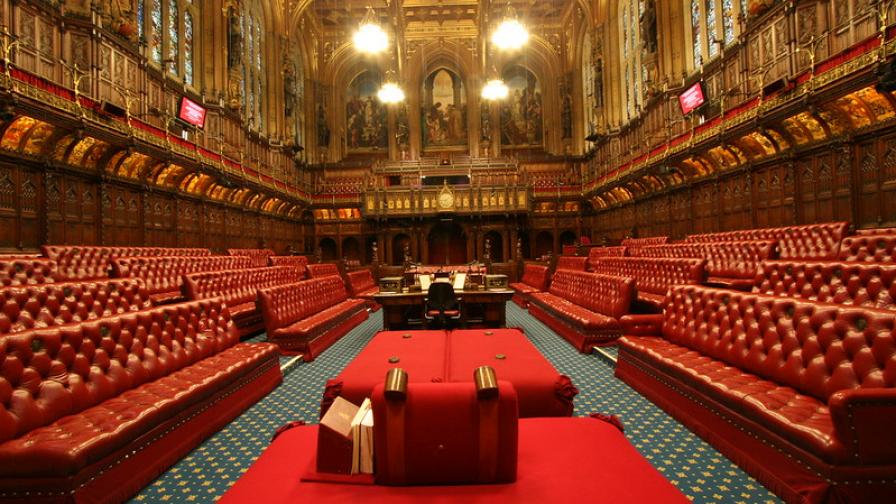
The UK Government must heed the Lords’ call to lead in international engagement on regulating autonomous weapons systems (AWS), and abandon its attachment to unproductive forums. The UK Campaign to Stop Killer Robots urges the Government to take serious action on the Committee’s recommendations on meaningful democratic engagement.
On Friday 1st December, the House of Lords AI in Weapons Systems Committee published its report on how autonomous weapons should be developed, used and regulated. The report is a culmination of a one-year inquiry into the use of artificial intelligence (AI) in weapon systems. In the report, the Committee has set out a number of recommendations to ensure that the Government approaches the development and use of AI in AWS in an ethical and legal way. Over the course of the year, Committee members have listened to evidence from academics, human rights organisations, scientists, tech companies, tech workers and engineers as they have grappled with the following issues surrounding AWS:
- The challenges, risks and benefits associated with them
- The technical, legal and ethical safeguards that are necessary to ensure that they are used safely, reliably and with accountability
- The sufficiency of current UK policy and the state of international policymaking on AWS
The inquiry has sought to address these issues against a backdrop of significant milestones for the Campaign to Stop Killer Robots – the most recent being the approval of a new resolution on lethal autonomous weapons by 164 states. The resolution is a step towards negotiations of a legal instrument and mandates the UN Secretary-General to seek the views and suggestions of Member States and observer States, civil society, the scientific community and industry on the way forward.
Overview
We welcome the Committee’s report and especially its recommendations that the UK should accelerate its efforts towards achieving an international instrument and ‘ensure human control at all stages of an AWS life cycle.’ Throughout the inquiry, the Campaign has been consistent in its calls for meaningful human control to be retained over AWS and a legally binding instrument to address the challenges and concerns raised by these weapons. New technology and AI is profoundly impacting defence and security presenting significant dangers. The Committee rightly describes the use of AI in AWS as ‘one of the most controversial uses of AI today’ and highlights the risks and concerns associated with them. The Government should take the opportunity, as the report states, to ‘step up and show leadership’ and push for further progress towards regulating AWS. It is positive to see that the report reflects the breadth and depth of the oral and written evidence submitted to the Committee.
International engagement
The report calls on the UK Government to ‘lead by example in international engagement on regulation of AWS.’ UK Prime Minister, Rishi Sunak, has been explicit about his ambitions to make the UK an ‘AI superpower.’ In July, the UK convened the first-ever session on AI risks at the UN Security Council and in November the Government hosted the first global AI Safety Summit. Whilst we welcome these events and the UK’s support of a landmark resolution on AWS as positive developments that recognise the urgency to address the increasing autonomy in weapons systems, the UK must do more to meaningfully engage on the issue of AWS internationally by supporting ‘the good of all through existing international fora and other relevant initiatives.’ It must also acknowledge and accept the limitations of current International Humanitarian Law (IHL) to be able to address the legal and ethical concerns raised by AWS.
The report describes the UK Government’s insistence on pursuing discussion through the Convention on Certain Conventional Weapons (CCW) as ‘surprising’ given that the CCW is politically deadlocked. The Committee is clear that the UK cannot continue doing business as usual and that it must get serious about its efforts to work with the international community on AWS. This seriousness must be reflected when the UK submits its views to the UN Secretary-General on the way forward – and the UK Campaign will be closely watching the Government’s response to the Committee’s report in this regard.
With the recent approval of the UN General Assembly resolution on AWS, there is now an opportunity to work together with other states in a more inclusive forum to address the risks posed by AWS. It is encouraging that the Committee recognises where the centre of the international policy debate currently lies in terms of an instrument containing prohibitions and regulations; that the direction of international action now points towards progress in the UNGA; that the UN Secretary-General has called for a treaty to be negotiated by 2026; and that activity in the UNGA illustrates that there is a broad coalition of states in favour of action on AWS. The Government must pay heed to these aspects in its response to the report, and to the UN Secretary-General’s call for inputs. We are hopeful that the UK’s support of the resolution signals its openness and commitment to actively and meaningfully engaging with the international community in this new forum to make progress on the regulation of AWS.
Democratic oversight
The report acknowledges public concerns about AWS and calls on the UK Government to ‘seek, establish and retain public confidence and democratic endorsement … especially in respect of AWS.’ In our response to the Minister for Defence Procurement’s appearance before the Committee in September, we drew attention to the Ministry of Defence’s development of ethical AI principles and the Defence Command Paper Refresh (DCP23) as specific examples where the Government should have involved civil society. Another example is the recent AI Safety Summit, which was described as a ‘missed opportunity’ by civil society because of its exclusion of crucial voices.
The report also calls for greater transparency and for ethics to be ‘at the centre’ of the Government’s approach to AWS. Prioritising an ethical approach to AI is imperative and the development of such an approach must be inclusive of all stakeholders, including civil society. The Government must act on the suggestions made by the Committee who criticised the MoD’s current approach as being inadequate. The Government must move beyond engagement rhetoric and be specific in the mechanisms and activities it is going to pursue to understand and address concerns raised by civil society and in the public sphere. The expertise that civil society and those with lived experience of AI harms have to offer is critical to the success of any initiative to address the harms associated with AI and prevent further digital dehumanisation.
But an ethical approach is not enough. Ethics alone will not prevent and mitigate the harms and risks associated with AWS. What is needed is an approach rooted in respecting and protecting human rights. The Campaign believes that public trust and confidence in AI can be increased by regulating the use and development of AI in weapons systems. An international legal treaty to prevent the automation of killing and keep meaningful human control over the use of force is the only way to draw clear lines and prevent unacceptable uses of advanced technologies in the use of force. In the context of procurement, any decisions on the procurement of new systems and uses will rest on shaky ground.
Defining AWS
One of the central recommendations of the report is that the Government should adopt an operational definition of AWS. Evidence provided to the Committee highlighted the difference of opinion on how important it is for the UK to have an agreed definition of AWS. The Campaign would argue that negotiations on an international legally binding instrument are the appropriate forum for countries to agree on a final definition – in the meantime, states including the UK should operate with reference to the definition for AWS provided by the International Committee of the Red Cross. This is the broad scope within which international discussion is currently operating.
Human control
We are pleased that the Committee has made it clear that the Government ‘must ensure that human control is consistently embedded at all stages of a system’s lifecycle, from design to deployment.’ There has been much concern about the removal of human control from weapons which would raise a host of moral, legal, and ethical concerns including entrenching dehumanisation in warfare and posing serious threats to international, peace, security and stability.
Failure to call for a legally binding statement
We welcome the Committee’s recommendation for a ‘swift agreement of an effective international instrument on autonomous weapons systems.’ However, the failure to include the critical words ‘legally binding instrument’ shows a lack of understanding was established amongst the committee as a whole as to why a legally binding set of rules would be more effective than a political declaration of intent – it is clear reading between the lines of the report that there was not consensus within the committee on this point. The failure to include a call for new law specifically also ignores the widespread support and increasing recognition of the need for a new international treaty to prohibit AWS that select targets and attack them with violent force without meaningful human control. The Committee welcomed the Bletchley Declaration. However, in the context of AWS it is important to recognise that such agreements including the Artificial Intelligence in the Military Domain (REAIM) 2023 Call to Action cannot be substitutions for hard laws to address the unique dangers AWS pose to humankind.
You can see all the evidence submitted to the inquiry here.
Photo: The House of Lords. Taken on March 11, 2008. Credit: UK Parliament.

